|
[ December 2009 ] | |
|
| |
|
|







|
|
TCHS 4O 2000 [4o's nonsense] alvinny [2] - csq - edchong jenming - joseph - law meepok - mingqi - pea pengkian [2] - qwergopot - woof xinghao - zhengyu HCJC 01S60 [understated sixzero] andy - edwin - jack jiaqi - peter - rex serena SAF 21SA khenghui - jiaming - jinrui [2] ritchie - vicknesh - zhenhao Others Lwei [2] - shaowei - website links - Alien Loves Predator BloggerSG Cute Overload! Cyanide and Happiness Daily Bunny Hamleto Hattrick Magic: The Gathering The Onion The Order of the Stick Perry Bible Fellowship PvP Online Soccernet Sluggy Freelance The Students' Sketchpad Talk Rock Talking Cock.com Tom the Dancing Bug Wikipedia Wulffmorgenthaler |
|
bert's blog v1.21 Powered by glolg Programmed with Perl 5.6.1 on Apache/1.3.27 (Red Hat Linux) best viewed at 1024 x 768 resolution on Internet Explorer 6.0+ or Mozilla Firefox 1.5+ today's page views: 299 (24 mobile) all-time page views: 3401018 most viewed entry: 18739 views most commented entry: 14 comments number of entries: 1228 page created Sun Jul 13, 2025 14:57:23 |
|
- tagcloud - academics [70] art [8] changelog [49] current events [36] cute stuff [12] gaming [11] music [8] outings [16] philosophy [10] poetry [4] programming [15] rants [5] reviews [8] sport [37] travel [19] work [3] miscellaneous [75] |
|
- category tags - academics art changelog current events cute stuff gaming miscellaneous music outings philosophy poetry programming rants reviews sport travel work tags in total: 386 |

| ||
|
- art -  (Reference image: www.imanhua.com - Mirror) There were a few things I had planned to do during the holidays, but as often is the case, they have fallen by the wayside. One of those things was to crank out a pictorial summary of the 武神 series - it's a shame that, to the best of my knowledge, it has never gotten (fan)subbed into English unlike many Japanese manga titles, likely since these titles get an airing in translated anthologies like Shonen Jump. Even after zipping up my Football Manager savegames, I doubt I can find time for that with all my other obligations, and will therefore settle for a few sketches of my favourite character, as usual. As can be observed, I attempted to shift the perspective somewhat, but ended up with a mish-mash that was not exactly what I had in mind. Much more practice required, but it's a change from the usual head-on drawings. Will probably draw a grid as reference as the first step the next time I try this.  [Click to view full image, 1024 x 768] (Reference image: www.imanhua.com - Mirror) This here is an attempt to capture the essential quality of the character, which in the original Chinese would be: 狂: (adj) - crazy, mad, unrestrained, violent, wild but which, as with many expressions, loses something in the translation. The faults in the sketch are certainly many, chief among them being the lack of volume, with there probably being too much white and too little/weak shading, and uncontrolled dotting in the hair region where the pencil came down too hard. Lack of training in anatomy also shows up in the musculature, which as with most things one is unsure of, one deals with vaguely and without detail, for an overall less-than-convincing effect. On the plot of the series itself, part of the appeal is that the personalities involved are mostly flawed, and even the best of them are at times downright callous. 克豹 (lit. Overcoming-Panther. It sounds silly when translated, I know), depicted above, is no exception (spoiler warning). Kind-hearted to a fault as a child, the death of his master led to the customary hunt for vengeance, terminated with a self-learnt technique which would have made Kenshiro proud (complete with kickass name: 屠神無悔, lit. Slaughter-God-Without-Regret, where the "god" refers to the class of humans known as "martial gods" - the general population figuring that if they could rip metal armour apart with their bare hands, they could call themselves whatever they damn well want). That incident released his natural "Heart of Beast", a battle attitude that grants a bestial wildness and mercilessness (other "martial gods" are mostly none too kind, and could probably be described as pale imitations), and which got him into a whole lot of trouble - his newfound strength allowed him to raise an empire in a year, but it was exceeded by his sheer arrogance, as he got it on with several of his courtesans in front of the entire United Nations of that era, and the First among martial gods. And survived, which might be the more impressive feat. I'll leave his story hanging, and those interested might read the full 300 issues of that series; but before that, it would be best to peruse the 144 issues of 海虎 (lit. Tiger-Shark), which came before (about 5000 years before) and provides the backstory. The high point of the art comes in 武神凤凰, a 138-issue side story, and sad to say the series appears to be in its death throes as the illustrations appear to have lost their edginess, and maybe more fatally, the characters have lost their distinctiveness, especially in terms of body shape and, dare i say it, soul. On the hamster front, Mr. Ham has been thanked for his assistance during the examination period (the professors were great too, actually bothering to look over one's work if submitted early), which he rather rudely responded to by kicking sand into my face. No matter, he was further rewarded with a move to the balcony (more fresh air), and now has a wastepaper basket located right beneath his cage door just in case he manages to get it open again. Hooray for elegant solutions! And just when I thought that the SAF had forgotten me, I got wind that my first ICT will be in the coming July. Ssss.
- reviews - "CDs?" - Voiceover from anti-piracy trailer shown before Avatar, followed by priceless quote from twc And the results are... CS4243 Computer Vision and Pattern Recognition - A+. Keeping up a perfect CA score worked wonders (although that's not saying too much, and that [or something close] should be within the reach of most motivated students), and the final exam was a touch easier than previous years. CS5206 Foundations in Algorithms - A+. Fortunate, as previously mentioned, and dampened by the realisation that there are a lot of seemingly simple problems to which I have no efficient algorithm. But hey, this is a foundations module, so I'll take my small victories where I can find them. CS5208 Foundations on Database Systems - B+. Actually a bit better than I feared; I would probably have given myself a vanilla B. Floundered about on some questions in the final which I thought were rather open-ended, and depended heavily on how the quantities used were justified, but it seems that the ones I chose, and the logic used, were ok. On hindsight, maybe our group could have fought for more marks on the project (the professor does have a captioned photo stating that "If you don't ask, you don't get" by his door); still, it's over, and I'll take my first non-A on a graduate computing module (sobzz). Onward next semester. When arriving at Bugis MRT for a financial planning session, I got approached by a clipboard-wielding young lad about donating for some cause. Sad to say, the sight of the clipboard brought back not-so-good memories, and I am ashamed to admit that I was in no mood to give in to his persistent entreaties, and instead scrutinized the donation records already on the sheet of paper, all of which indicated sums of S$10 or more. I am even more ashamed that my next thoughts after that were whether some of these records were added for the same reason as panhandlers salt their cups with a few coins to get the ball rolling (if I recall rightly, they were written pretty neatly in a similar hand, and it might be more natural to let the donater write his own name), and then estimating how long it would have taken him to accumulate the twenty-odd donations (coincidentally, today's New Paper ran an experiment where a guy got a single S$20 donation in five hours and 50-odd rejections, though he didn't have any clipboard and didn't look particularly endearing) The young lad finally offered to take less ("just S$5?"), but I could do no more than follow the precedent set by the others, since I did not see any such sum on the clipboard record previously (warning bells in head approach critical level). Might this be a useful study on Singaporean psychology? It may be unworthy to be suspicious where charity is concerned... Yeah, right. After the session, I took in the new National Library for the first time, and spent a hour contentedly browsing through a few back issues of Newsweek. Returned Bamboo Goalposts, which I had only borrowed due to a reference in Soccernomics. While it is indeed mainly about football development in China, the author Rowan Simons (Luo Wen to his Chinese friends) makes the book more than just that, and describes, among other events, how he got caught up in the Tiananmen Incident (visitors from China, please do not click the link) in 1989. 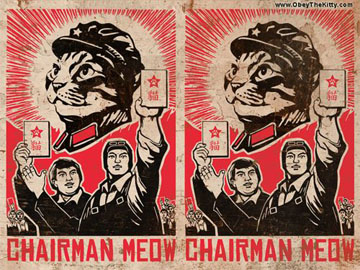 Chairman Meow, on the other hand, doesn't care (Source: Critteristic) The passage that stuck most in my memory was not even related to football, but the tale of a student who put forth an innocuous question to his teacher - his poster of the Great Chairman Mao was becoming tattered, and thus he asked, would it not be disrespectful to leave the poster in its current less-than-pristine state? Yes, it would be disrespectful to do so, the teacher said. Then, the student asked, could he paste a new poster of the Chairman over the old one? Would it be disrespectful to cover the face of the Great Chairman? No, cannot cover, it would be disrespectful, the teacher said. Finally, the student asked, could he remove the old poster, since he might tear the poster if he did so, and that surely would be disrespectful? No, cannot remove, it would be disrespectful, the teacher said. As my astute readers would probably have figured, this leads to a dilemma, which the student quickly pointed out - cannot leave as is, cannot paste over, and cannot remove, so how? The teacher passed the buck, and eventually it was decided that for bringing up an impertinent question that was guilty of having a logic that would not yield to Communist virtue, the student was sentenced to re-education (i.e. hard labour) And there his story ends. Christmas Eve Sat in on a lab meeting at 9am (counter to my usual sleep cycle), where the Desert Fox somehow got mentioned in a far-reaching discussion, then skipped the Japanese food-meet before watching Avatar in 3D at Great World City. Before continuing, it has to be stated that Avatar is visually very arresting and probably deserves better than some of the snark that follows; here's the review (and a few miscellaneous observations) from the eyes of a Com Sci student (spoiler alert):
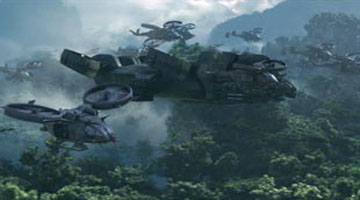 Autogun Array 1, Stone-Age Aliens 0 (Source: Pandorapedia) And on to the plot proper. Synopsis: A disabled Marine fills in for his deceased Ph.D. twin brother as the controller of an Avatar, or a na'vi body that is used to communicate with actual na'vi, who live peacefully at one with Nature within lush jungles, and whose planet-moon Pandora (which has air that is toxic to humans) might have been completely ignored by humans had they not had the bad luck to have some black mineral required for transportation (not oil), that the humans want. But since they do have the mineral, some huge faceless corporation from Earth sends in loads of workers and soldiers to get it one way or the other, and after half-assed attempts at negotiation (the Avatar-ed hero doesn't even broach the subject within his three-month deadline, being too busy cavorting with his newly-found na'vi girlfriend...) the decision is regrettably made to further the persuasive process through liberal application of heavy weaponry. This mostly works until the na'vi, who had been getting stomped on thanks to using bows and arrows against machineguns and mechs, inexplicably get the aid of a horde of bulletproof indigenous monsters because they are the good guys and there was no other remotely plausible scenario where they could have prevailed. For 10 marks: Discuss the extent to which the movie is a commentary on the colonization of the Americas (for extra credit, state similarities between na'vi and American Indian dress and customs) and the more recent US-led invasion of Iraq (hint: consider the "shock and awe" strategy applied in both cases). Extend this discussion to the process of cultural assimilation since the dawn of human history. I'm not sure if a sequel will be produced (likely yes), but if history can teach us anything, it's a nine out of ten chance that the humans will return with bigger guns and raze the area containing the minerals to the ground (amortizing the extra expenditure over several accounting periods), before establishing a large security perimeter (guerilla wars were lost and the invaders pulled out in Afghanistan and Vietnam, but those places didn't have oil, diamonds or some other delectable extractable resource) and strip-mining the land to their heart's desire. Also, if atmosphere engineering is at all viable, the na'vi will soon enjoy the joys of some addictive drug (alcohol with the American Indians, or opium with the Chinese, but perhaps Civilization CXXVIII or Football Manager 2159 this time round), and begin trading their lands away for that stuff and other trinkets, eventually subsisting on tiny reservations, selling authentic na'vi handicrafts, raptor rides and photo-taking opportunities, and eventually lobby for the exclusive rights to build integrated resorts to make a better living. Some of the children of the flood of human immigrants will of course be briefly indignant at how their ancestors treated the na'vi, and rail about the injustice of it all on some corner of the native Biointernet (now bought over by some human corporation), and hold the occasional street protest, hunger strike and candlelight vigil, until they grow up and get a job with Mineral Mining Inc, and begin to delete all evidence of their participation lest it affect their chances of promotion. Maybe, just maybe, one of those kids will become a visionary holomovie director around the year 2250, and pen a budget-bursting historical epic about how some tribe in some ancient era of Earth were going to be driven from their fertile lands and exploited by a bigger, meaner tribe, and how an unlikely hero arose and led that plucky little tribe to improbable victory in a tearjerking finale with stunning special effects and a very cute female lead actress as warrior-princess. This will certainly spark the brisk sale of holomovie tie-in merchandise, and should also inspire at least a few wiseguys to recognize the parallel between the Earth fable and what is happening to the na'vi on their beloved Pandora, and proudly publish little comments and articles on it and... nothing. As that avatar of angst-ridden teenagers, Holden Caulfield, might have said, people are almost without exception phony hypocrites (myself included), but if an impartial revelation of how magnificently self-centered we actually are (as opposed to what we would like to believe) were made, a madness that would make the sight of Cthulhu a welcome respite might likely befall our feeble minds - so perhaps it is for the best that this perception is sealed from us. Or, these people might then walk out of the holomovieplex, and quickly forget their noble concerns when faced with tasty morsels, perhaps obtained thanks to the underpaid labour of some nameless na'vi, somewhere far, far away: 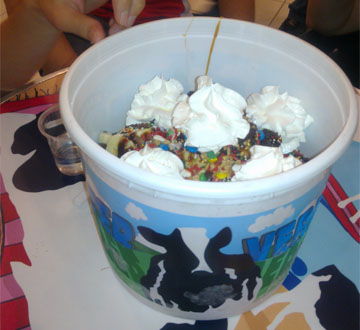 The legendary Ben & Jerry's Vermonster (S$88) Who cares, really? There is no absolute justice, anyway. La dolce vita, here and now; Mineral Mining Inc is doing well, overhauling the incumbent RDA Corp, and the division manager is throwing a party. There are rumours of a generous half-year bonus. Those blueies should have been more cooperative from the beginning. We came in peace - well, mostly - and bore the gifts of civilization, we offered education, gave medicine. They shot arrows at us after we helped them to clear some forestland for development. Those bloody trees were a real eyesore anyway. The people eat, drink and make merry. Ah, to hell with the ungrateful blue f**kers. If they won't move on into the new world, they'll just be dragged kicking and screaming into it. Another ice-cream? Oh, and Merry Christmas! Ho ho ho! For 5 marks: Discuss whether the fiery destruction of the gigantic na'vi Hometree (and collateral ecological damage) is a suitable metaphor for the "meaningfully agreed" COP15 talks. 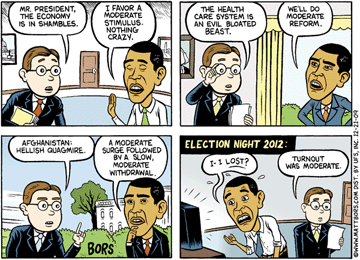 (Source: mattbors.com) Epilogue: But cruel as this story may seem, it's more or less the story of mankind thus far; Little groups meet, and if they do not merge, eventually they fight - and then the winners absorb what's left of the losers, taking their women and settling their lands. Families became clans, clans combined into tribes, tribes formed nations, and nations forged empires. When the stories of the vanquished are made into plays and told with skill, we may weep for the fallen. But the right to mourn them came from victory in the first place. How many here know of which petty fiefdom their forefathers belonged to, two thousand years past? But by the mere fact of their existence, they do know that it is not one of those - those many - that were extinguished oh so long ago. Not only were the people and the unique identities of those tiny kingdoms lost, the living would, very soon, not even bother to forget them. This is the doom of man, after all. It is a sad world, but a glorious one. Afterthought: Maybe the humans could have tried religious engineering, sort of like the Missionaria Protectiva in the Dune universe, or what one simply calls missionaries in real life; the humans certainly had sufficiently advanced technology to masquerade as magic (or divine favour), and quite often the natives are only too happy to spread the word by themselves (see cargo cult, which has a Com Sci application in cargo cult programming) Walked to Orchard Road, but got on the MRT before the countdown. I might rename my pretend punting challenge to How To Throw Away $100 Challenge after what has happened in recent weeks (at $829/$1400 now). Quitters don't win, so... $50 on Birmingham to draw Chelsea (at 3.50) $50 on Fulham to draw Tottenham (3.20)
- travel - Pre-trip: Dinner at Hotpot Culture, Marina Square with eight 4O people, but no L4D2 as the LAN shops in the area were all packed. Stayed up to watch United stumble against Villa. 13 December 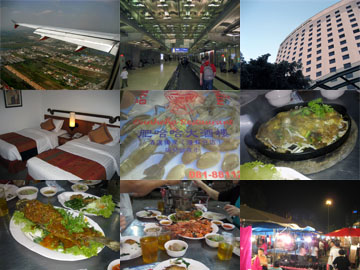 Off on a Jetstar flight to Bangkok's Suvarnabhumi airport [1] on a rare family holiday. Don't remember much about the last time I visited Thailand (with the army) about five years ago, but I probably landed at the older Don Mueang airport then, and from the boarding pass I kept, it was with Thai Airways. Spent a couple of hours in transit [2], chomping down some fried rice with shrimp, before transferring to an AirAsia flight to Chiang Mai. Waited some time for the representative from the car rental company, but we were soon in a Honda City, which would be our primary mode of transportation for the next three days.  More data for licence plate recognition Zoomed over to the Imperial Maeping Hotel [3], where songstress Teresa Teng used to stay when in the vicinity, and which was quite comfortably furnished [4]. Dinner was at Ounheha Restaurant [5], a roadside affair a short drive from the hotel. Following on from my habit in Europe of taking photos of food (a practice which I had previously scorned), I snapped some pics of the omelette [6], fish [7] and prawns [8], which were truly delicious (and also very affordable). The concentrated iced chrysanthemum tea, which came in glass bottles, was heady too. Went for a stroll along the (Sunday) night market [9] after that, and soon discovered that while there were more stalls than one could shake a wallet at, almost none of them had unique goods; if one had missed out on a black wooden figurine, say, or a particular design of shirt, it is almost a given that another stall will have exactly the same wares somewhere down the street, which is as close to a perfectly competitive market as I have seen for awhile. 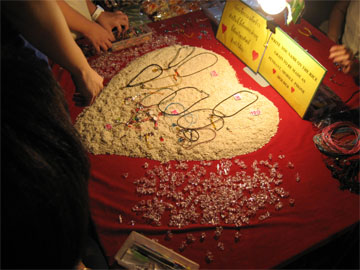 Could be mistaken for a cooked rice stall? Most of the goods on offer didn't quite catch our fancy, but there was an innovative service that allowed customers to have names or other messages written down on grains of rice, which could then be inserted into hollow plastic pendants and floated in dye to make a personalised gift. My mum put in a bulk order, and the young lady manning the stall made perhaps a week's rural wage out of that alone, so I suppose creativity (and written English) goes a long way everywhere. 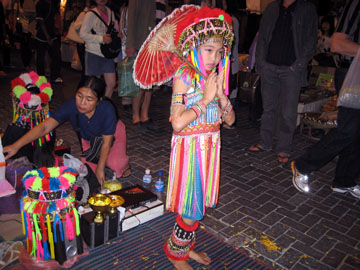 So you think you can dance? The market had its fair share of buskers and performers too, and a popular makeup was the three or four man ensemble, either huddled together in a circle, or sitting in a line, banging on improvised instruments. They were probably outshone by a couple of cute kids in tribal dress, who perennially gathered a fair-sized crowd about them. One played some variant of a zither, while the other danced slowly and gracefully to it. As if that were not enough, they had a sign proclaiming that they loved the king, which should score extra brownie points anywhere in Thailand (more on this later). Discovered that the Thai traffic police do issue parking tickets (that were unintelligible to us), and that wireless access at the Imperial Maeping was very weak, to say the least. An hour's access cost 150 baht, and all I got out of that was a Google search that showed 150 baht was about equivalent to S$6.30. They had two sports channels to make up for it, and Liverpool versus Arsenal was on. I wouldn't normally have watched this fixture, but as there was little better to do at this time, I changed into my United sweatpants, opened a packet of salted cashew nuts from the minibar, sipped the complimentary Chang-branded drinking water, and sat down to the game. Arsenal showed some nice touches but precious little aggression, and appeared to have bottled it after Kuyt put Liverpool in front just before half-time. With the result looking a foregone conclusion, my siblings retired, and missed out on the Glen Johnson own-goal and Arshavin wonderstrike in the second half. Pool probably deserved a draw and could feel hard done by, with Gerrard not getting a penalty after getting rather obviously stopped by Gallas in the box, but unfortunately for him he has probably gotten a bit of a reputation for going down easy. 14 December 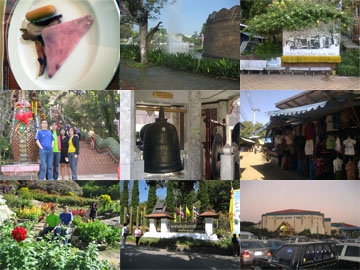 Tucked into the buffet breakfast in the hotel's dining room, and started with a bit of ham and bacon [1] [Mr. Ham G. Bacon: Hey!], fried rice and waffles, and washed it down with a lychee drink. Saw the city in daylight, and other than the sections of ancient fortifications [2] that were preserved, what struck me was the prevalence of portraits [3] of the Thai king (monks come a distant second) - one can hardly drive a mile without being confronted by a huge poster of his likeness either mounted overhead or on buildings, and even the humblest workman's room will have one, often several, pictures of His Majesty. One is also continually bombarded by the fact that the king has just celebrated his 82nd birthday (or more formally, the 82nd anniversary of his birth), and by all accounts he is well-intentioned and genuinely beloved of the people (and also a former SEA Games gold medallist in sailing). However, with the political troubles that the country seems continually mired in, the quote from 100 Minds That Made The Market that one has a lot of power, as long as one does not try to use it, comes to mind. On this point, there was an editorial from the Bangkok Post on a seminar at the local university, where students were asked about their respective allegiances - did they support Thaksin's redshirts, or the (purportedly-royalist, but it's complicated) yellowshirts that are against him? The speaker then made the students sit according to their loyalties, and went on to convince both side that they were not completely in the right; Thaksin wasn't exactly an angel (with heavyhanded extrajudicial executions in his War on Drugs, and the Shin Corp saga, for example), but his opponents overthrew a democratically elected leader, so it seems like a case of grey and gray morality driven by self-interest (as usual). As mentioned, everybody still loves the king, and that is perhaps the reason why the three-laned road up to his Bhubing Palace up in the mountains is so well-maintained. On top of that, the mountain air was refreshing cool, so much so that we wound down the car windows for long stretches. We stopped by the Wat Phrathat Doi Suthep temple first, with the 300-plus step climb up to it [4] being a decent workout, reminding me of a similar (but longer) flight of stairs back in Cinque Terre. The purportedly impressive view of Chiang Mai was obscured by mist, unfortunately, but there were plenty of shrines and bells around, not a few due to the largesse of Singaporeans - one was funded by someone from Ang Mo Kio, and another by two people from Tampines [5]. Not to forget, there was also a distinctive jackfruit tree: 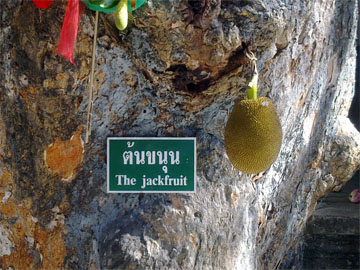 This is THE jackfruit. There are many like it, but this one is IT Went back to the palace, but it appeared that it was on lunch break, so we headed on to the Hmong hilltribe village, on an uneven two-lane track that necessitated cooperative driving. One thing about Thai drivers is that they understand give-and-take, and after a reasonable wait at a junction, nobody will blare their horns at you for cutting across, and it all works out. Try that in Singapore! The village itself was a hot and dusty place, with more shops [6] than I would have expected the area to support, again selling much the same stuff (same suppliers?). Business can't be that bad as new shopfronts were being hacked out at intersections, though, and low rent and overheads may have something to do with it. A man tried out a newly-carved wooden crossbow at the entrance to the museum, which was manned by a teenager selling tickets at 10 baht each. That at least won insight into the secret of the giraffe women (their necks are not lengthened, rather their ribs are pushed down), hands-on experience on traditional farming implements, and a look at opium poppies in their well-maintained garden [7]. Even there, a trader tried to sell precious stones to us, an offer that was politely declined. It was then back to the palace [8], where my sister had to rent a leg covering as shorts were not accepted within. The palace grounds weren't too exciting, reminding me of a botanical garden, but there were at least two sights that were worth a look - the Celestial Fountain of the People, a musical fountain recently set up in honour of the queen, and a stand of giant bamboo that should make any panda extremely happy (the Chiang Mai zoo does have a new panda cub, Linping). Ice-cream helped too, and incredibly, Italian gelato was offered by some stores back in town. Got an inadvertent tour of the town (i.e. lost directions), before getting back to the hotel and catching a bit on sandpaper manufacture on the Discovery channel. For dinner, we went to the Central Airport Plaza [9], a modern shopping centre that wouldn't look out of place in Singapore. The property agents with their scale models of palatial residences broke the illusion, though - from what I could make out, a bungalow could be had for just one or two million Thai baht, which is around S$40000 to S$80000, or one percent of the equivalent back home!  I think that says 1.69 million baht Ate at The Pizza Company, which had delectable drumsticks, walked the shopping centre, bought bread for the night, and gaped at their cylindrical aquarium. Next up was the Anusarn night market, smack in the hotel district, which however didn't offer anything special over the Sunday market, other than perhaps some display cases of butterflies and other insects, and even a couple of bats, which distressingly reminded me of winged hamsters, but which should make good presents for discerning entomologists.  The must-have Thai fashion accessory of the season Wandered about as dad got a foot massage, and came across the Singha singlets that were requested by my cousin, and decided to get one for myself. The haggling ritual ensued, and reduced the price from 250 baht to 150 baht each, with the stallowner following the practice of emphasizing her final offer by displaying it on her calculator, even though verbal negotiation had worked perfectly fine before that. We then marvelled at the near-photorealistic skill of the roadside artists, before I tried and failed to get a copy of an English-language newspaper, and ended up swiping a copy of The Nation from the hotel. 15 December 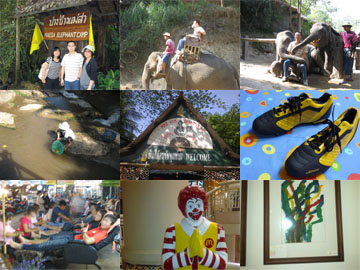 Another buffet breakfast, then it was a long ride to the ISO9001-certified Maesa Elephant Camp [1]. Finding it wasn't too difficult, as we followed a single road for much of the distance, passing by an artillery camp, all-terrain vehicle (ATV) parks, rally car tracks and rifle ranges on the way. The camp starts early, and we caught only the tail end of their show, and had a lot of time to burn before it was repeated. This meant a 30-minute elephant ride, which was sort of like getting on a double-decker bus with a temper. The mahout, seated on the elephant's head, was blissfully unconcerned, as if it was the most natural thing to do. The circuit incorporated a couple of refreshment stations for the great beasts, as well as some nervous uphill bits, and a river break. Posed with the elephants after that [3], which required the initial offering of a bunch of bananas (swallowed whole), and a small tip for the mahout at the end to avoid being sprayed. Popped round to the art museum (a painting by elephant artists, entitled Cold Wind, Swirling Mist, Charming Lanna I, once sold for 1.5 million baht), elephant museum (with some informative facts), a house dedicated to Ganesha, and nursery (but with no tiny baby elephants, sadly), before the elephant bathing prelude to the next show. Their dung is collected even then [4], and among its other uses, it can even be used to manufacture paper. We then got good seats for the show proper (see Youtube video above for selected portions), which began with a procession and obedience demonstration (interestingly, elephants appear to take an order to lie down as one to empty their bowels). Astoundingly, they can play the harmonica with their trunks, but the highlight must be their football skills, with maybe a FIFA regulation size 20 ball. So those T-shirts back in town weren't lying. They can be impressively accurate with their kicks, though miscues can be dangerous - a few shots landed on (or over) the roof of the gallery, and one stinger demolished a wooden railing. They could even take goal kicks with their trunk dropping the ball for a good kick! Probably all that's left is to train them to dive and writhe on the ground, and the age of human dominance in the sport may be over. Painting skills (original artwork may be purchased for anywhere from 500 up to a few thousand baht) followed, mostly by young elephants, before an elephant massage demo, and a darts game, where the pachyderm champion handily defeated a tourist. The final logging part showed off the power of their trunks, and the combination of dexterity and strength may prove very useful for a Humanbot. Dropped by the Mae Rim Snake Farm [5] next, a rather run-down place with plenty of lethargic snakes on display in various cages and pits, probably not worth the admission for that alone. One can be crowned with a snake if he so desires, as some other tourists were, and the show saved the day. 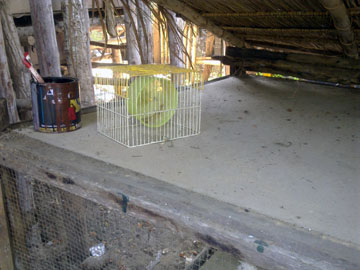 Mr. Ham does not like this Strains of Ra Ra Rasputin played as the announcer joked about in surprisingly fluent English, advising visitors to sit on the top tier if they were concerned. One tourist and his lady companion plonked themselves down in the middle tier regardless, and of course got mercilessly taunted by the performers, who threw a section of rope near them, and let one particular snake crawl out of the ring. A side attraction was a toddler on the other stand, who appeared horrified much of the time. Touched one of the cobras for luck, but apparently the show was far more dangerous ten years ago - no worries, however, as the hospital is only five minutes away, or so the snake charmers say. Visited the Kad Suan Kaew shopping centre and had teppanyaki chicken, and got an Apacer card reader from their IT World store for photo transfer purposes, forgetting that my netbook had a built-in one. Electronics aren't a particularly good deal in Thailand, with prices similar to those back home. They do have good deals on shoes, however, and an incidental trip to Sports World ("the world of sports") led to the purchase of a pair for badminton, and another pair for field soccer [6], at about S$20-odd apiece. I had wanted a side-laced Nike Total 90 ripoff, but they were too narrow. Lingered a bit in the arcade where my brother kept his marksmanship in practice, and marvelled at how helpful the carpark attendants, both at the hotel and at the shopping centre, were - they will even guide your reverse parking using a whistle. Relaxed at the hotel, where I caught Football Focus on ESPN, with an intermission each time the advert for Tiger Beer was supposed to appear. It seems to be due to laws on alcohol advertising in Thailand, though I wonder if it will have much impact. It was then back to the Anusarn night market, where I initially didn't want to have a foot massage [7], but changed my mind after ten minutes of aimless walking. The rate was 140 baht an hour, the massage was more ticklish than painful, and for some reason my left leg was more sensitive than my right. My masseur was a young man who spoke some halting English, and who may be entering university soon. All in all, the rubdown did not appear to have much effect, but your mileage may vary. 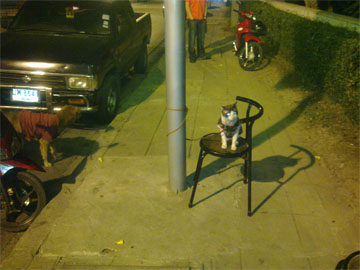 Stop looking at me swan Strolled around, wondered how bamboo worms might taste, mum bought some dried longans, and spotted a Dijkstra wooden carving on a stall - no photos allowed, sadly. Supper at McThai's [8], which had similar prices to Singapore, and had a bite of broccoli pie, which was tasty against all expectations. Rounded the hotel, and noted the Internet cafes offering an hour of access at just 30 baht, a broken telephone in a booth, and a clothed cat which somehow got leashed to a lamppost (dogs appear to frequently be clothed too, with one robed like a monk!). Discovered that the hotel had a couple of elephant masterpieces [9] too. 16 December 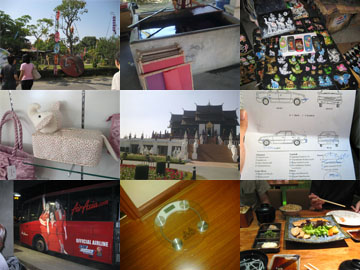 Got my hands on another copy of the Bangkok Post, and got to know of Google DNS through its Database section. Back on the topic of the king, the newspaper reported that some officials had set up protecttheking.net for people to snitch on anti-monarchist activities. So far so good, but the registration ran out and was bought by an Englishman who set up a loansharking website there, to red faces all around (the original site is now here). Morning visit was to the umbrella factory [1], which takes visitors through the entire process, from the making of the paper [2] to the tooling of the handle and construction of the frames and final painting [3]. Nothing too special in their factory outlet (saw a Condo-L game that looked suspiciously similar to Jenga, though), and the Na Na Na handbag shop [4] at the entrance ended up sucking up most of the custom, with fellow Singaporeans recognized by their going "cheap, cheap" within. The next attraction was the Royal Flora Ratchaphruek 2006 , originally an exposition built in honour of the king (as always). It wouldn't have looked out of place in Singapore, being clean and meticulously organized. There was far too much to cover in the few hours we had, and we settled for a tram ride around the grounds, which held an impressive collection of internationally-themed gardens. The centerpiece was the Ho Kham Royal Pavilion [5], which was beautifully decorated within, rivalling some cathedrals I've been to. The trip to the gardens was itself eventful, with the purchase of a secret gift for Mr. Ham, and the sight of a posh glass-and-concrete condo surrounded by wasteland on both sides. Slacked at the Central Airport Plaza again, and caught sight of Red Cross donation boxes for old clothes that reminded me of the path these clothes take in Poor Story - apparently, they might be sold in bulk to businesses which sort them into different grades, and resold, with the most threadbare (but likely most comfy) going for the least. Returned the trusty car (which the agent took his time inspecting [6]), and slept on the return flight to Bangkok (N.B. Bangkok arc coming soon on Mafia Wars!) after bidding Chiang Mai farewell. Experienced the Bangkok landing approach that took us pretty close to residences, and had to take a bus [7] to the terminal because they didn't want to move the plane, which does make some sense. Next, it was time to negotiate for our cab ride into Bangkok proper, and the first driver, who had a large enough taxi for five people, pushed his luck by demanding 700 baht for the trip, which my father turned down without a second thought - a metered fare for a single cab is usually only about 300 baht, after all, but one can't really blame the drivers for trying. Checked in at the Baiyoke Suite Hotel, which is more akin to an apartment than your usual hotel - each two-person suite even has a living room with couch and television, and if that were not enough, there's a flat-screen TV mounted on the wall of the bedroom too. They even had a router in the room, but by then I was not at all eager to go online. They even had one of those fancy weighing machines [8] that calculates one's body fat percentage! Where else but Bangkok can one find a shrine to a four-faced Buddha right next to a gigantic ultra-modern mall with Burberry emblazoned on its outside? For a small fee, one can buy garlands, joss-sticks and candles to offer, and also hire Thai dancers for a short performance. Had dinner at Zen Cucina [9] at the CentralWorld shopping centre, the atmosphere of which put Orchard Road to shame. Even the outside was packed with tables where customers can get beer on tap directly, and the giant screens showed United nearing the end of their 3-0 hiding of Wolves. Tried to shave with the complimentary razor back at the hotel, but gave up in disgust at the bluntness of the blades. Dad stayed up to watch CSKA Sofia versus AS Roma, while I tried to fall asleep in the bedroom. 17 December 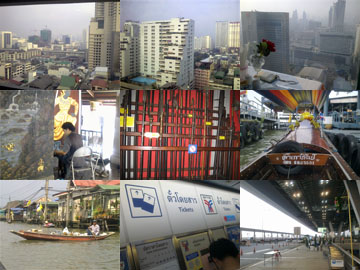 Last day in Thailand, which kicked off with a buffet at the hotel's 43rd storey Sky Lounge, where we had a good view of Bangkok's charming and more... organic architecture [1, 2, 3]. One sees the old right next to the new, and the contrasting mix is one that meticulously-planned Singapore will not have. Of course, it's likely less efficient too, so one can't have it all. Got in a taxi (whose driver amusingly prodded half-heartedly at the meter only after being asked to) to the Grand Palace complex, which apart from its famous golden towers and the Wat Phra Kaew, the temple housing the Emerald (actually jade) Buddha, is still a work in (re)progress [4]. There was a flood of students dressed in uniforms very similar to that of TCHS (white shirt and khaki shorts, but brown shoes and socks), and also art students engaged in sketching. We then took a tour of the Royal Armoury [5], where strictly speaking no photos are allowed, so I have no idea how this got onto the camera. With no time to lose, an hour-long river taxi tour [6] was up next, and it got bumpy at times, especially when the boatman sped up. Mindful that I had too much memory remaining on my handphone, I snapped photos with wild abandon. Another boat [7] approached us to sell refreshments and bread with which to feed the fish, but unfortunately for him we had already stocked up. Got on land to look at another shrine and drink coconut milk. 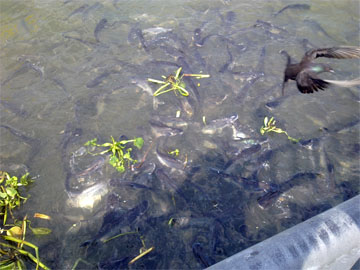 BK Fish Special Made a final round of Bangkok's shopping centres, connected by a network of overhead bridges, which if messier than Singapore's underground solution, does exude vitality. Some of the malls even had metal detectors at their entrance, to what end I do not know. The most memorable store was one that sold a variety of products (e.g. bags, shoes) made from such exotic skins as deer, snake and crocodile. Travelled a station on the BTS (Bangkok's MRT, which uses the old magnetic card technology) [8], and perhaps MRT management could look at the handhold design within BTS trains. A final bit of shopping (where I got another singlet for 100 baht, lower than even after bargaining at Chiang Mai) and a treat at Swensen's later, it was time to head back to the airport [9], with our cab driver speeding back, stopping to refuel en route. Apparently some of the reduction of pollution in Bangkok (the air was clear all the time we were there) can be attributed to the use of CNG hybrids, a practice that Singapore is only recently adopting. Our flight home was on Tiger Airways, and the shipping lights in the Gulf of Thailand were soon replaced by the dazzling ones of Batam, Johor and of course, Singapore. Singapore's size was made all the more apparent as we saw the entire eastern seaboard, from the Singapore Flyer to Changi airport, in great detail on the approach. One thing about the creatively-named Budget Terminal is that it is truly budget - the fittings are raw and almost military, and there being no travelator, the only option is to walk hundreds of metres to the exit. Another cousin, who's currently working part-time for my father (shoutout to his blogshop), arrived to pick us up, and that was the end of the Thai trip. Tonight's pretend betting, currently at a poor $829/$1400: $50 on Liverpool to beat Portsmouth (at 1.45) $50 on Manchester United (-1.5) vs. Fulham (2.50)
 Lazy lazy eyes... It's sad when the best idea for relaxation (after exhausting the games) I could come up with was coding more stuff, so with a couple of free hours before the 4O hotpot session, I figured I might as well get more sketching practice in. Today's theme is brilliant but lazy, also known as the best of both worlds. Will discuss more on this sometime. A limitation of 20 to 30 minutes per character, which hopefully are identifiable (if not, it's either a case of my artistic failings or the reader's comic-reading ones). Can't buy a win in pretend punting, and now down to $829/$1300 after a good start, kind of like Hull City last year. Today's go: $100 on Manchester City to beat Bolton (at 1.72)
Alright, where to start? Some more badminton and swimming these few days. Michael Owen scores an improbable hat-trick against Wolfsburg (with United winning despite having nearly no defenders), reigniting his World Cup dreams, although as a Manchester United Number Seven I'm not sure why he bothers, as it'll probably end in tears. Website of the day is TV Tropes, and frankly it's slightly worrying how many of the games/webcomics/manga/series I have encountered. One instance of a trope is the Sorting Algorithm of Evil, which covers why heroes always get matched up with baddies that are challenging but within their capacity to defeat (and improve themselves in the process) Where else can one find a website that links such disparate themes like DotA, the Discworld, Civilization (the game), Adventure Quest, Eyeshield 21 and Monty Python, to name but a few? Ah yes, sigh, and the World of Ham, since Mr. Ham has a contract to appear in a set percentage of blog posts.  Tsk tsk, no regular flossing detected Today's hamster care tip is on how to get gunk out from between your hamster's teeth. There is the hard way, but it can be traumatizing for (mostly) defenceless furballs. The more subtle way, recently discovered, is just to turn on the air conditioner and bore the (comfortable) hamster to sleep. One can then carefully pick at its pointies with a toothpick. On home improvement, my uncle (a real handyman) recently repainted the whole house (tip: for a smooth surface, use brushes and not rollers), I dusted about a bit on sufferance, and got a new (springless) mattress. Found a bug with toes, but forgot to snap a photo of it before it was disposed of. Mindful of the fact that I should be doing something towards my academic obligations, I got a 1TB external hard disk drive from Sim Lim Square, and proceeded to back up the sum total of my university files, as well as some other stuff, onto it (I've come some way from the days of 3.5 inch floppy disks, then the short-lived Iomega Zip drive, then writable CDs and DVDs). Hey, it had to be done some day. Continued cycling through loans from the library. Tried more economics-type stuff, which can be summarized as follows:
Sounds like a great job to me, if one can get it.
- sport - - Why England Lose, page 217, sadly sounds true  (Source: Amazon.com) Amazon are getting pretty spot on at making book suggestions, and some time ago when I was agonizing on whether to splurge on The Black Swan: The Impact of the Highly Improbable by Taleb (I didn't), I recalled another book being shown that I too thought of ordering. Yes, it was Why England Lose, the premise being beyond debate. Therefore, when it caught my eye on the shelves of the local library, I snatched it up immediately. Freakonomics has opened the floodgates for entertaining economics exposés, and a paperback edition of this book is unabashedly titled Soccernomics, even as it inherits from the seminal Moneyball, which six years ago broke ground on how to build a winning professional baseball team on the cheap. Well, as the book combined at least two of my loves, I eagerly went through it in one sitting (and lying), and here is a summary of the main questions, answers and observations - so those of you who don't want to be spoiled, please reboot your computer or close your browser window now. Back to the key puzzle - why do England lose (in major tournaments?) The authors note an inevitable cycle (which may slightly uncharitably apply to other teams too):
Another myth: There actually are too many Englishmen playing in England, as limiting the import of foreign talents would also reduce the incentive of native players to improve (note a parallel with the Singapore economy). So long, Platini. Some months ago, I did a short piece on why the manager of one of United's archrivals might have been mistaken in using limited transfer spending as an excuse for poor performance. As it turns out, spending on wages appears to have a stronger effect on results than spending on transfers (though that club did spend on average 85% of what United did, and it might be argued that players would be justified in demanding raises with better results, so cause and effect may be a bit murky) The flip side to this is that transfers are often extremely inefficient, especially for clubs which fire managers readily - then, the usual practice is that the new gaffer sells existing players that he doesn't rate at a discount, and splashes cash on some shiny new stars, and if the club doesn't do as well as the board expects, he is fired and a newer manager is hired, who does the same thing all over again. Real-life examples: Newcastle, Tottenham, Real Madrid. The authors note other glaring market inefficiencies:
Also, football clubs, despite appearing to have huge revenues (around half a billion US dollars per year for the largest clubs), are actually tiny in the world of business, even more so when profits are concerned (most don't make any). For most of their existence, clubs were generally horrible at business, for example paying manufacturers to wear their gear, and hiring managers that were recently fired (well, they were good enough to be hired once upon a time...). However, they are also extremely long-lived, and in fact 97% of the clubs that existed in the English Football League in 1923 still exist, while far bigger companies have long since crashed and burned (about half of the top 100 companies in 1912 were no more by 1995). It is said that they do not disappear not only because they can often simply get relegated and safely subsist at a lower level, but the fundamental reason is because they are not businesses, but social organizations. The book explains that the most (and most successful) clubs usually spring from factory towns, as those areas usually had large numbers of poor immigrants searching for an identity - and found it in football. Capitals, while richer, didn't have that problem. London is always London and Paris is forever Paris, but Newton Heath only had its football team to be proud of. The authors however note that this may change in the future. Another observation: There actually are very few diehard supporters in proportion to the entire population of football followers, and it is common in China to support multiple (even rival) teams at the same time, much less switch one's support. Yet another observation: While the right to host a World Cup (or other major sporting events such as the Olympics) seems to be a money-spinner, there are actually few monetary benefits after opportunity cost is factored in; however, there is a benefit - people in the host country get happier, which might be considered in monetary terms if so desired. Then there's the counterintuitive assertion that poor people (and countries) should do better in sport, usually due to it being their escape from poverty. The authors had established that there were three major factors that predict a nation's success in football - their experience (twice as much is worth about half a goal!), their population size (twice as much only about 0.1 goals), and their wealth (about the same). In short, to win, it helps to have a long footballing history, a lot of people to choose from, and money. But why money? Well, it is true that being a poor immigrant in a rich country may induce both a hunger to succeed from football and the free time to practice incessantly. However, being outright poor often means plain old hunger, malnutrition, and poor health and physique - hardly the ingredients professional footballers are moulded from. I saved the section on penalty kicks for last (no pun intended), in particular the part on the United-Chelsea shootout in the 2008 Champions League final. The book reveals that Avram Grant had the aid of one Ignacio Palacios Huerta, who wrote a paper on how penalty kicks were taken when a graduate student at the University of Chicago (it took eight years to gather the data). We all know about Lehmann's cheat sheet during the 2006 World Cup, and Huerta had one for Grant. He noted that van der Sar usually dived to the "natural side" of the kicker, i.e. to the right for a right-footer and vice versa, and saved the most kicks when the kicks were at mid-height (about 1m in the air). Huerta also pointed out that Cristano Ronaldo often stops in his run-up, and if he stops, he had an 85% chance of kicking to the right of the goalie. He also gave advice on going first if his team won the coin toss, but I guess that is common knowledge. Looking back, it is quite amazing how well his advice turned out. The Chelsea players all kicked to van der Sar's left, which with the exception of the left-footed Ashley Cole, was just what Huerta ordered. Of course, John Terry slipped up, and van der Sar finally wised up and engaged in mind games with Anelka. Perhaps psyched out, Anelka committed both mistakes at one go - he hit it to his natural side, and at mid-height, and the rest, as they say, is history.
 Hawking razors may be hazardous (Source: Huffington Post) As it turns out, Woods isn't even the best golfer in the world, or so North Korea says - their invincible Dear Leader went 38 under par in a single round (with five holes-in-one, each presumably with plenty of witnesses), and it was his first time playing! And the world media doesn't peer too deeply into Kim's private dalliances, so why do that to poor Woods? The draw for the 2010 World Cup has also been concluded last night, which I caught via live streaming from a Chinese channel, which provided near-instantaneous translation from English (or maybe they had it on a slight time delay?) North Korea got into the "Group of Death" composed of five-time champions Brazil, heavyweights Portugal and the Drogba-led Ivory Coast, which might lead to a dive-fest when the latter two duke it out for second place, if all goes according to form. But not to fear, the bunny-eating Dear Leader has prepared for every eventuality, and has banned the World Cup from being broadcast in the Workers' Paradise unless they win, which I suppose is a polite way of saying that they aren't going to pay capitalist imperialist pigs for the TV rights. Creative video editing would probably be able to make it appear that their ball-kicking heroes of the proletariat utterly dominated their opponents, however, and only failed to qualify due to the machinations of the immoral Western conspirators. Not that I have the right to condemn their practices, seeing as to how I led an invincible Manchester United side to 50-plus wins in a row and a historic Quadruple in my first season as their manager, on Football Manager 2008, yesterday. Their unfortunate opponents might possibly have thought thus:
Too bad North Korea probably won't be hosting the World Cup anytime soon, otherwise they could have taken a leaf out of the South's books... This seems an opportune time to mention Take This Job and Ship It, a book by Democrat Senator Byron L. Dorgan. It covers, among other things, how US companies have avoided taxes by re-incorporating themselves overseas, how jobs are outsourced overseas even when the comparative advantage arises from exploitation, how pharmaceutical companies charge US citizens higher prices for medical drugs, and how reasonable tariffs can curb job leakages. In fact, as often seems to be the case with such books, there is a token reference to Singapore (on page 105): "...drug companies are being courted by Singapore; lured by tax breaks, Merck is investing $500 million for two plants which will manufacture Zocor and Eztrol, both cholesterol drugs. Oh my! But what of the dangers of shipping drugs from Asia to America?" The major conclusion that I was left with, after getting through the book, was however simply this: Isn't this a case of global wage equilibrium in progress, as predicted by standard economic theory? Mr. Dorgan has his constituents (who voted for him) to think about, but from another perspective, is there a good reason for two workers, who simply happen to live in different countries, to be paid different amounts for the same work? The key argument used against cheap imports was that labour is commonly commodified and exploited in developing countries, and examples of mistreated child workers, and workers that toil under poor conditions and are literally worked to death, and all that for a paltry 30 US cents or less per hour, are given. The trouble is that a few US dollars a day is in fact a good living wage in many areas, while minimum wages in the US are mostly above US$7 an hour - if employers overseas cleaned up their act and began offering more humane working hours and a raise, there is no running away from the fact that a company can hire five good, content and disciplined line workers elsewhere, for every worker in the USA. In a free market, what happens is that it simply makes little sense to keep unskilled or semi-skilled manufacturing jobs in the States - such jobs are, unfortunately, commodities, as previously explained, and it is useless to pretend otherwise. Therefore, the call for trade barriers, but using such measures as a long-term solution are likely incompatible with both accepted economic theory and America's international role. Not that this is good news for us, since the logic applies equally to Singapore. In the business of making stuff, we do retain some advantages such as stable government, a compliant workforce and well-enforced laws, but the bottom has been falling out of the barrel for some time - there are always cheaper hands available to screw in a bolt than can be found in either Singapore or the USA (N.B. one might even take a module on IT outsourcing). The real test will come when a machine, which I dub the Humanbot, is developed, which can essentially perform any repetitive semi-skilled task that a human worker can, for cheaper than even the barest subsistence wage. This will of course not be simple, as such bots would need to be both dexterous and strong, capable of being easily trained (or programmed), and require low energy consumption. However, the task is also not unthinkably difficult, as it does not require anything near true artificial intelligence to be useful. If and when the Humanbot is invented (and mass-produced, possibly by self-replication, although that is not a requirement), there will have to be a sea change in economics, and indeed the whole of human organization, as we know it. It would sever, for the first time in history, the sacred bond between labour and survival, the requirement to work to live. Not completely, but near enough. I have been lucky enough to experience first hand the effect of price competition - for years, I had visited the neighbourhood barber monthly, and he charged S$8 per head (more during festive periods, probably less some years ago and for kids). Then Snip Avenue moved in, with a hipper ambience, and charged half price. One rainy Thursday afternoon, I made it down to Snip Avenue, only to see that they were extremely understaffed (or overworked) - they didn't even have a spare guy to man the counter, and I ended up taking a seat for half an hour with no reprieve in sight. Frustrated, I went back to my old barbershop, only to see a completely empty shop, with just two aged barbers (neither my usual one) idling inside. I ended up amortizing the cost of the visit by getting the good ole NSBoy Number Three buzz cut, which is extremely comfy, tidy and functional. Perhaps I should consider having it as my usual hairstyle :D Now, I have to say that the barber was meticulous in giving the buzz cut, spending quite a bit of time trimming the edges just so (though there being no other customers might have contributed), compared to a Snip Avenue cut. Sadly, I have a feeling that they will be driven out of business sooner rather than later, as even their core clientele - elderly men - seems to have migrated for cheaper pastures. Four dollars twenty cents is four dollars twenty cents, after all. One thing that could be both cheaper and better would be lab-grown meat (link by zh). Would this end religious bans on meat consumption, since such meat feels no more pain than a vegetable? More creepily, it might make it possible to eat ourselves, in a manner of speaking. $829/$1100 and falling for virtual footie punting, and here's the rescue mission underway: $100 on Liverpool to beat Blackburn (at 1.52) - their lean spell seems over $50 on Manchester City to draw Chelsea (3.50) - technical analysis, I believe that's what it is called $25 on Sunderland to beat Fulham (3.50) - sorry, Mr. Ham $25 on Tottenham to beat Everton (2.25) - this is to make up for it, Mr. Ham
- academics - The final two exams went by today, and I couldn't have asked for much more for either of them. Foundations in Algorithms came first, and it must be noted that algorithmic problems generally fall into one of two categories - those that one knows almost immediately how to go about solving, and those that one doesn't (uh oh). Problems in the second category may well be fun, but not in a two-hour examination. As our professor (modestly) said, he may not be much smarter than us, but he has probably seen a heck of a lot more questions (and methods to solve them). 此乃吃的盐比你吃的饭多? [N.B. A surprising number of the CS profs pepper their lectures with the occasional Chinese phrase, for example the use of 管中窺豹 to describe the aperture problem] Well, borrowing more programming terminology, as the past year paper contained a couple of questions from the recommended textbook, one technique would be to memoize the answers by just attempting questions from the textbook and bringing the solutions in (the less scrupulous might be tempted to [illegally] procure the instructor's version of the text). Hey, it's an open-book test - don't bring only a knife to a gunfight (unless it's in a friendly game of Counterstrike)... Very fortunately for me, a couple of the questions given had been covered in this way, which was especially lucky as I had solved the given exercises fully only up to Chapter Four of the material; for one of the questions, I was in the happy position of simply copying my prepared solution into the answer booklet, especially as it was the sort which I would be unlikely to comfortably produce from scratch on demand. For the other question, I had neglected to type out the solution, but the fact that I knew it admitted a greedy solution (since it was listed under that chapter in the textbook) was already a tremendous help. Thomas Edison famously tried a thousand ways before getting his lightbulb right, but in an examination, there are only so many avenues one can explore before running out of time. The problem [Question 13 on page 4 of the PDF here] involves minimizing the weighted sum of the completion time of a series of jobs. However, ordering the jobs either by the time taken, or by their importance, can quickly be shown not to yield a correct solution. Because of this, students who have not seen this problem before might reasonably suppose that the problem does not have a greedy solution, since such solutions usually involve some simple ordering of some criteria on the objects involved. As it happens, however, such an ordering exists - but it is neither time taken nor importance by itself, but the ratio of the two. Okay, this fact can also be deduced by considering the equation that arises from swapping any two consecutive jobs, so saying that it is impossible to derive it would be incorrect.  Swap you your Job Two for my Job One However, the intuition that the ratio matters does not come very naturally, and had I not encountered the problem before I would probably have moved on to dynamic programming or some other more complex approach (and inevitably failed). It has to be said that analysis by inversions had come out for one of our homework assignments, but it was but one of a huge number of possible methods to attack the problem. [N.B. After the examination, one of the other students soon noted on the module forum that the solution appears in the 1956 paper, Various optimizers for single-stage production by W.E. Smith (which does use the proof by inversion, and may go to show that today's 30-minute examination question is just yesterday's original research)] The Computer Vision examination was, I felt, rather easy, especially in comparism to previous years (almost no linear algebra involved, for starters). Whether this is beneficial to a student depends on how well he has done on the Continual Assessment (CA) portion of the course, since a very easy (or very tough) final that sees most students score about the same, would place extra importance on CA scores. Then, how well do these examinations measure my proficiency in either algorithms or computer vision/pattern recognition? Well, perhaps not extremely well, since for instance my grade on the algorithms paper might have been rather poorer had I not been fortunate enough to have come across the question. Employing another computing/statistical analogy, examinations might be viewed as a form of sampling. What one really wishes to measure is how many facts/problems in the field a student knows/can solve, but even in the unlikely case that the field can be well-defined, there are usually just too many of these entities to check for. An examination therefore chooses a tiny subset of facts/problems, and works on the assumption that, since these facts/assumptions are often closely related, it is a good approximation of the student's true ability. Coincidentally, Singapore's exam culture made its seasonal appearance as the topic of the day, at least on my Facebook social network, with the foreign system of choice this time being the Canadian one. One obvious question would be why performing "volunteer" duties is considered particularly voluntary if it is mandatory for graduation (and marks can be gained for it); moreover, local schools do participate in their fair share of community work too. The more damning accusation is that "...one's future and career is based solely on academic results". Is that true? Well... if one wants to enter a profession, such as being a doctor, lawyer, engineer or accountant, among other such jobs, one can't quite run from meeting certain academic standards, i.e. passing competency exams, whether in Singapore or Canada. Surprise, surprise. There seem to be a few main issues here. One is that Singapore focuses too much on rote memorization and mugging narrowly on examinable content (especially for youngsters), another is that they are pigeonholed into talent brackets too early, and a third is that one can't make a decent living in Singapore without academic credentials. On the first point, yes, there may be some degree of cramming, and on the second point yes, there is a grouping of students by assumed ability (assumed, since some abilities may not quite mesh). But in the sciences in particular, there is no getting around the fact that there are certain foundational facts that are not quite open to reinterpretation, so why not get them right early? Also, I would be astonished if there really were no such things as "better" schools or "more advanced" classes, in Canada or elsewhere. So it boils down to the third point, and indeed many desirable positions require a degree at minimum. But is this really that different in other countries either? The knock on Singapore having no Nobel winners also rankles - even China and India have but a mere handful, and if some lone Singaporean genius (or two) manages one in the coming decades, would it suddenly redeem the local educational system in a flash? For now, just pass the freaking tests already (clip courtesy of twc): That, or think like a hamster and live a stress-free life.
|
||||||||||||||||||||||||||||||||||
 Copyright © 2006-2025 GLYS. All Rights Reserved. |
||||||||||||||||||||||||||||||||||